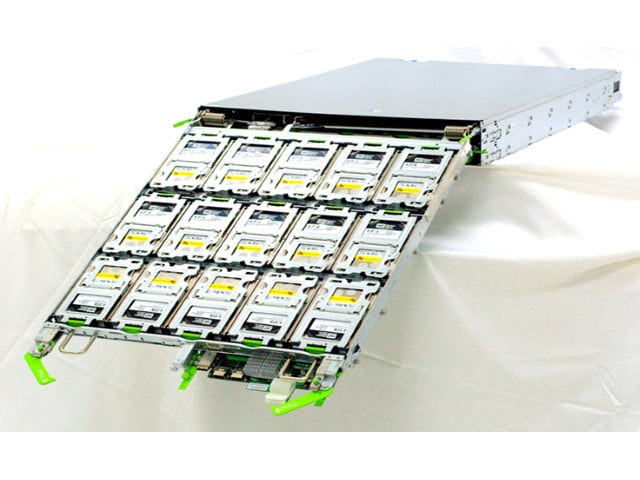

Facebook opened up a lab in its headquarters in Menlo Park, Calif., for vendors to test their software onOpen Compute Project hardware.
Michael Liberte wrote in a blog post that Canonical and Red Hat were the first vendors to take advantage of the open lab, adding:
Canonical and Red Hat were the first software vendors to come in and validate their software on three of Facebook’s open hardware components: dual-socket Leopard servers (below), Honey Badger storage enclosures (below) and Knox JBODs (just a bunch of disks) (above). Canonical and Red Hat deployed their most popular software packages to see if there were any compatibility challenges, and the results were what we had hoped for: Nearly every software package worked out of the box on all three components.
We successfully deployed and tested Canonical’s MAAS and Juju, Red Hat Gluster Storage,Ansible by Red Hat and Red Hat CloudForms, and both companies’ flavors of OpenStack. The latest releases from both companies’ Linux distribution (Canonical’s Ubuntu and Red Hat Enterprise Linux) also worked seamlessly. (You can read more about Canonical’s certification here, and Red Hat’s certification at redhat.com.) To top it off, bare-metal provisioning and hardware discovery was an absolute breeze using the solutions we tested. This is important with vanity-free open hardware, which is built for warehouse-scale computing and often does not include convenience features, like CD drives and video cards.
He also offered more details on the thinking behind opening up the lab:
With traditional vendor-specific solutions, hardware is tightly coupled with proprietary software. The hardware is redundant—meaning there are backup ASICs (application-specific integrated circuits), memory, cables, connectors, PCBs (printed circuit boards), power supplies and more in the case of any component failures—and the software is created to assume redundancy. Both the hardware and software solutions are developed, tested and supported by vendors, and are guaranteed to work together. System provisioning and management tools are also tightly coupled with the hardware, making it difficult to manage multiple vendor solutions in a single environment.
We welcome all software providers—creators of both off-the-shelf and open-source software—to our lab to validate their solutions. There’s an industry need for commercial software to work on open hardware, and the lab is available to ensure that the software is compatible with the latest OCP solutions. Over time, we’re hoping to expand the lab to include hardware solutions from other OCP members, as well.
Vendors interested in accessing the Menlo Park lab can email [email protected].
Readers: What are your thoughts on Facebook opening up its lab to third-party vendors?


[Source:-Social times]





